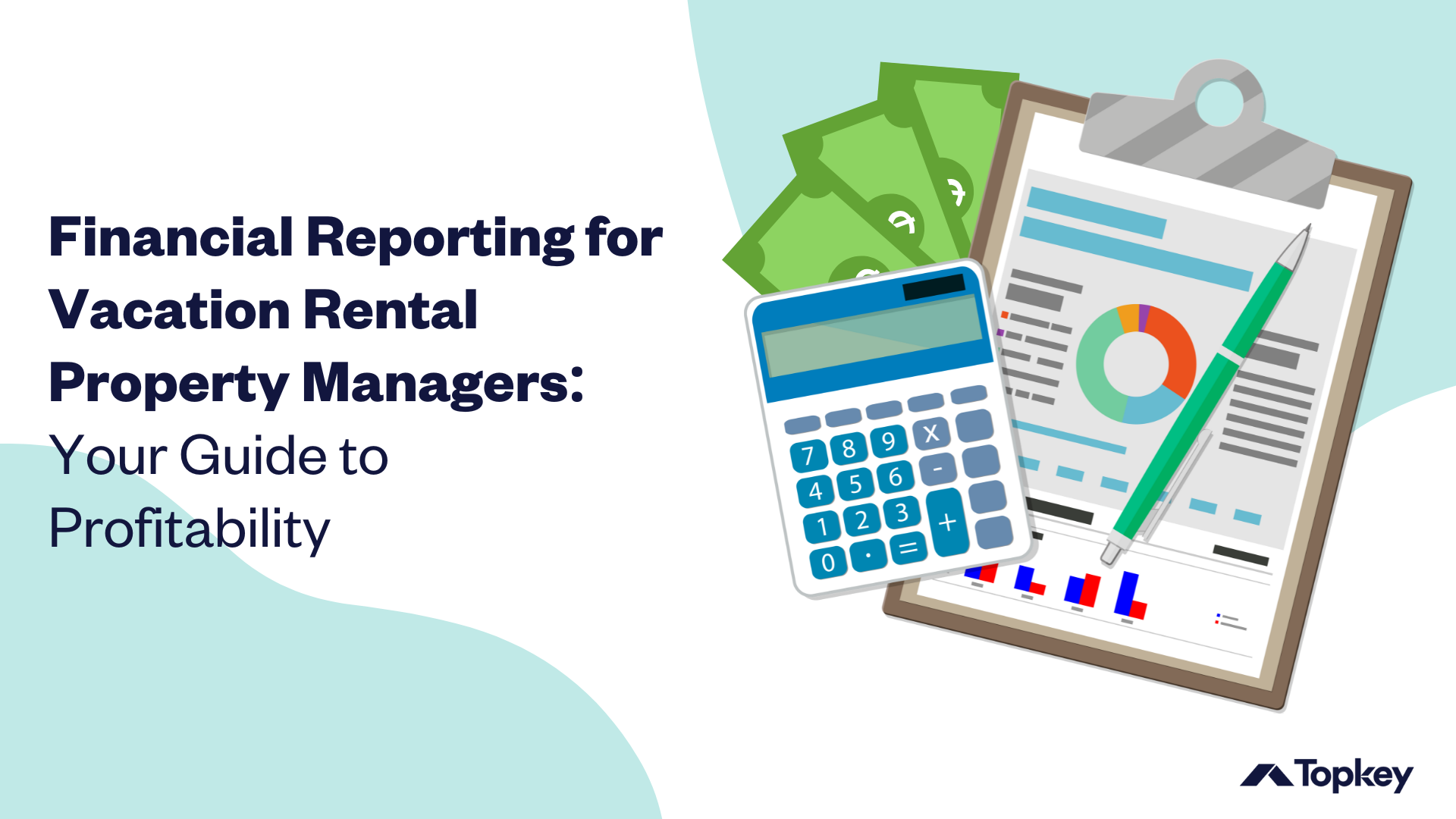
In the dynamic world of short-term rentals, success extends far beyond beautifully furnished properties and glowing guest reviews. The true pulse of your vacation rental business lies within its financial health – the revenue streams, the outgoing expenses, and the robust systems you have in place to manage it all. Whether you're overseeing a handful of Airbnb listings or managing a diverse portfolio across multiple booking platforms, mastering financial reporting is one of the most powerful tools in your arsenal.
However, for many vacation rental property managers, the realm of bookkeeping and financial reports can feel like a significant burden, especially when navigating various software systems, inconsistent data, and the rapid turnover of guests. In this comprehensive guide, we'll delve into essential financial reporting best practices tailored for short-term rentals, spotlight key tools designed specifically for property managers like you, and offer actionable tips to maintain organization, ensure compliance, and ultimately boost your profitability.
Understanding the Essentials: Why Financial Reporting Matters for Short-Term Rentals
At its core, financial reporting is the systematic process of tracking, summarizing, and presenting your business's financial performance. It goes beyond simply adding up income and subtracting expenses; it's about gaining a clear and comprehensive understanding of your operational landscape and leveraging that knowledge to make informed, strategic decisions.
For vacation rental property managers, this typically revolves around four fundamental reports:
- The Profit and Loss Statement (P&L): This report details your income and expenses over a specific period, revealing whether your business is operating at a profit or a loss. Understanding your P&L is crucial for long-term sustainability, as it shows if your rental income is effectively covering your operating costs.
- The Balance Sheet: Providing a snapshot of your business's assets (what you own), liabilities (what you owe), and equity (your net worth) at a specific point in time, the balance sheet offers insights into your financial stability.
- The Cash Flow Statement: This report tracks the movement of cash both into and out of your business, helping you identify potential liquidity issues and ensuring you have enough cash on hand to meet your obligations.
- The Owner Statement: This is a financial report provided to property owners that summarizes income, expenses, and payouts for their property over a specific period.
Understanding these reports provides the clarity needed to strategically plan for slower seasons, make informed investment decisions for growth, and confidently navigate tax season. Without reliable financial data, you're essentially navigating your business without a compass.
Best Practices for Accurate Vacation Rental Financial Reporting
Establishing sound financial habits is the first step towards accurate reporting. One of the most common mistakes we see vacation rental managers make is commingling personal and business finances, which can lead to significant headaches during tax preparation and compromise the integrity of your financial data. Utilizing a dedicated business bank account and corporate card (like those often integrated with platforms such as Topkey) ensures that every business transaction is easily traceable and reportable*.
Another foundational best practice is implementing real-time tracking of your finances. Waiting until the end of a quarter—or even worse, the year—to reconcile expenses inevitably leads to errors, overlooked deductions, and stressful last-minute catch-up sessions. Instead, make it a regular part of your weekly routine to reconcile bank statements and categorize expenses as they occur. Tools like Topkey can significantly automate this process by directly syncing with your Property Management System (PMS) and accounting software, ensuring your financial data is consistently up-to-date.
Finally, standardization is paramount. Establish consistent categories for both your income streams and expense types across all the properties you manage. This not only accelerates the reporting process but also facilitates meaningful comparisons between your different listings, allowing you to pinpoint your top-performing units and identify areas where improvements can be made.
Essential Financial Reporting Tools for Vacation Rental Managers
Manually wrestling with spreadsheets and cross-referencing various booking platforms with your accounting software is not only time-consuming but also highly susceptible to errors. Fortunately, there are purpose-built tools available to help vacation rental managers automate and simplify their financial reporting processes.
Platforms like Topkey offer an integrated financial automation solution specifically tailored for the unique needs of short-term rental managers. It seamlessly connects with your existing Property Management System (such as Guesty or Hostaway), your preferred accounting software (like QuickBooks Online or Xero), and your business bank accounts. This powerful integration enables you to automatically track income, categorize expenses (such as cleaning fees, maintenance costs, and utility bills), efficiently manage receipts, and generate insightful financial reports—all from a centralized and intuitive dashboard.
Unlike generic financial tools, platforms like Topkey are designed with a deep understanding of the hospitality industry's nuances. For instance, they often allow you to filter reports by individual property, specific expense type, or even the original booking source, providing you with granular insights into where your profits are generated and where potential leaks might be occurring.
For those who are just starting their vacation rental management journey, well-structured spreadsheets with pre-designed templates can be a good starting point. However, as your business scales and the complexity increases, investing in automation becomes absolutely essential to maintain organization, efficiency, and accuracy in your financial reporting.
Preparing for Tax Season: Financial Reporting Best Practices
When tax season looms, many short-term rental owners find themselves scrambling to gather scattered receipts, resolve inconsistencies between records, and decipher which expenses qualify as legitimate deductions. However, with robust financial reporting practices already in place, tax filing becomes a far less stressful, and significantly more accurate process.
Begin by meticulously tracking all sources of income, including any bookings made outside of your primary platforms. It's easy to overlook direct bookings or reimbursements for damages, but these omissions can significantly impact the accuracy of your tax filings. Similarly, diligently keep records of all deductible business expenses, such as:
- Cleaning and maintenance fees (including linens, cleaning supplies, and handyman services)
- Property management service fees
- Mortgage interest and property insurance costs
- Utilities (electricity, water, gas) and internet service
- Supplies, guest amenities, and welcome gifts
- Software subscriptions and online listing fees
Specialized tools like Topkey streamline this process by automatically organizing expenses into categories that align with IRS guidelines and generating exportable reports that can be readily shared with your tax professional.
Don't overlook the crucial aspect of local taxes. Depending on your specific location you may be responsible for collecting and remitting occupancy taxes, tourism levies, or city-specific short-term rental fees. Proactively stay ahead of these obligations by setting regular calendar reminders and reviewing local compliance regulations on at least a quarterly basis.
Avoiding Common Financial Reporting Mistakes in Vacation Rentals
Even seasoned property managers can fall into common pitfalls that can lead to financial strain or compliance issues. One of the most frequent errors is the failure to comprehensively track all income, particularly when accepting payments or reimbursements directly from guests outside of the main booking platforms. This can create significant discrepancies between your bank accounts and your booking records, making audits considerably more challenging.
Another significant oversight is neglecting to review your financial reports on a regular basis. If you only examine your Profit and Loss statement once a year, you're missing valuable opportunities to identify areas for cost reduction, enhance operational efficiency, or address underperforming properties in a timely manner. Make it a habit to review your key financial reports at least monthly and actively look for any anomalies—such as unexpectedly high expenses, units with consistently low occupancy rates, or unexplained gaps in your booking revenue.
Perhaps most importantly, resist the temptation to "wing it" when it comes to your finances. As your vacation rental business grows, the financial complexities will inevitably increase. Investing in the right tools and establishing robust processes early on will undoubtedly save you significant time, money, and unnecessary headaches in the long run.
Bonus Tip: Automate Your Vacation Rental Finances Wherever Possible
Remember, your time is your most valuable asset. Automating recurring financial tasks can dramatically reduce your administrative workload and significantly improve the accuracy of your financial data. For instance, platforms like Topkey often allow you to:
- Automatically categorize recurring expenses, such as regular utility bills or consistent cleaning service fees.
- Issue and efficiently manage virtual corporate cards for your team members or trusted vendors.
- Set specific permission levels for bookkeepers or accountants to access real-time financial information securely.
- Receive timely alerts for any unusual overspending or anomalies in your transaction patterns.
The less time you and your team spend manually sorting through receipts and reconciling transactions, the more valuable time you can dedicate to optimizing your guest experience—or strategically growing your vacation rental portfolio.
Final Thoughts: Build a Financially Resilient Vacation Rental Business
In the competitive and rapidly evolving landscape of vacation rentals, the businesses that achieve long-term success are invariably those built on strong financial foundations. Financial reporting isn't merely a back-office administrative task—it's a critical strategic asset. When implemented effectively, it empowers you to understand profitability at the individual property level, make smarter and more informed investment decisions, and ultimately grow your business with confidence and clarity.
If you currently feel overwhelmed by the financial aspects of your vacation rental business, take it one step at a time. Begin by establishing dedicated business accounts, carefully select a financial tool that aligns with your current needs and budget, and commit to consistently tracking both your income and expenses. As your business expands, explore more advanced, integrated tools like Topkey that seamlessly connect with your existing systems and offer comprehensive financial automation—from streamlined expense management to efficient bookkeeping.
Ready to Simplify Your Vacation Rental Financial Reporting?
Topkey is designed to help vacation rental managers like you eliminate the burden of manual spreadsheets, streamline the often-tedious process of expense tracking, and gain real-time, crystal-clear visibility into your financial performance—all within a unified and user-friendly platform.
See the Topkey difference.


